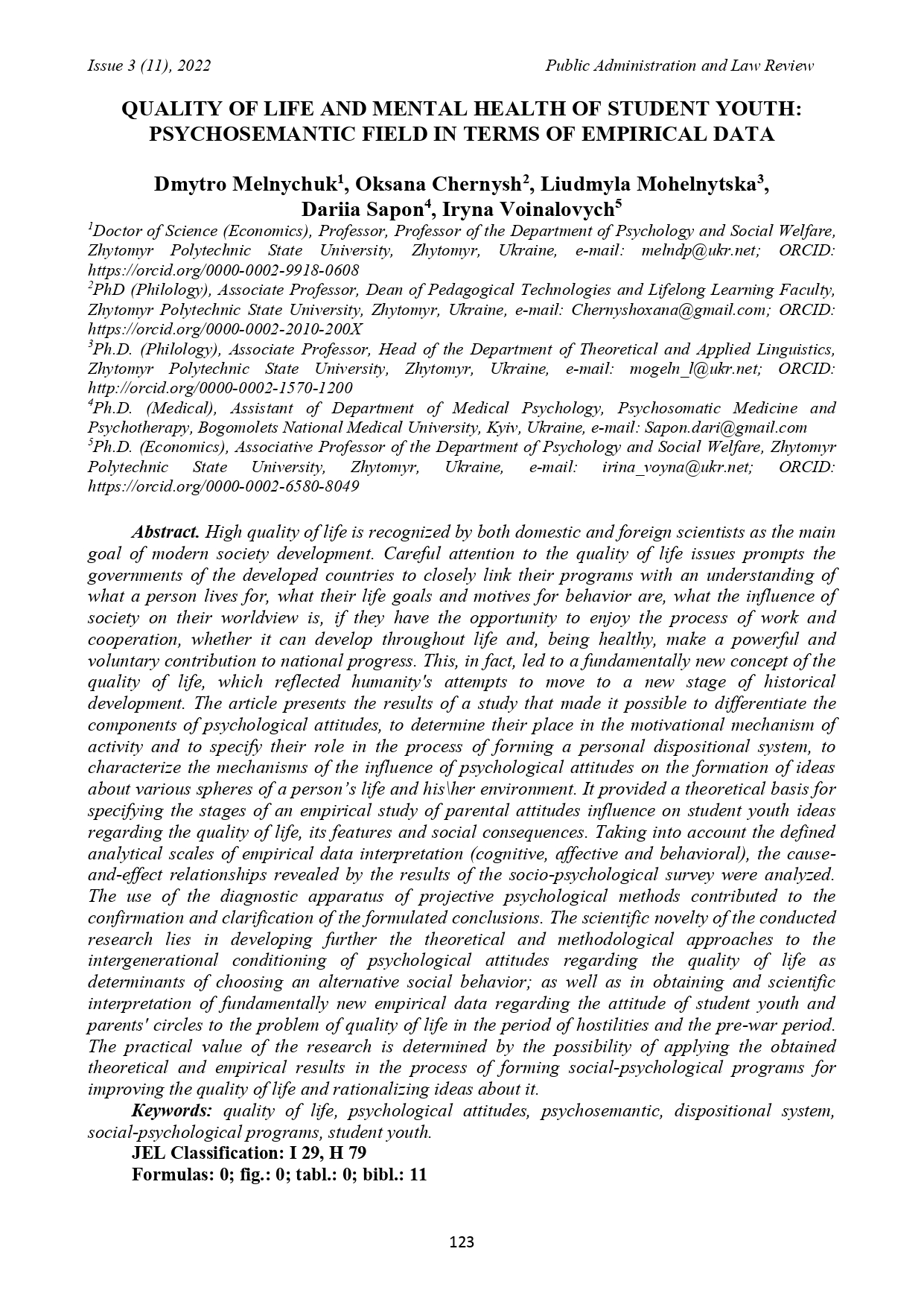QUALITY OF LIFE AND MENTAL HEALTH OF STUDENT YOUTH: PSYCHOSEMANTIC FIELD IN TERMS OF EMPIRICAL DATA
DOI:
https://doi.org/10.36690/2674-5216-2022-3-123Keywords:
quality of life, psychological attitudes, psychosemantic, dispositional system, social-psychological programs, student youthAbstract
High quality of life is recognized by both domestic and foreign scientists as the main goal of modern society development. Careful attention to the quality of life issues prompts the governments of the developed countries to closely link their programs with an understanding of what a person lives for, what their life goals and motives for behavior are, what the influence of society on their worldview is, if they have the opportunity to enjoy the process of work and cooperation, whether it can develop throughout life and, being healthy, make a powerful and voluntary contribution to national progress. This, in fact, led to a fundamentally new concept of the quality of life, which reflected humanity's attempts to move to a new stage of historical development. The article presents the results of a study that made it possible to differentiate the components of psychological attitudes, to determine their place in the motivational mechanism of activity and to specify their role in the process of forming a personal dispositional system, to characterize the mechanisms of the influence of psychological attitudes on the formation of ideas about various spheres of a person’s life and his\her environment. It provided a theoretical basis for specifying the stages of an empirical study of parental attitudes influence on student youth ideas regarding the quality of life, its features and social consequences. Taking into account the defined analytical scales of empirical data interpretation (cognitive, affective and behavioral), the cause-and-effect relationships revealed by the results of the socio-psychological survey were analyzed. The use of the diagnostic apparatus of projective psychological methods contributed to the confirmation and clarification of the formulated conclusions. The scientific novelty of the conducted research lies in developing further the theoretical and methodological approaches to the intergenerational conditioning of psychological attitudes regarding the quality of life as determinants of choosing an alternative social behavior; as well as in obtaining and scientific interpretation of fundamentally new empirical data regarding the attitude of student youth and parents' circles to the problem of quality of life in the period of hostilities and the pre-war period. The practical value of the research is determined by the possibility of applying the obtained theoretical and empirical results in the process of forming social-psychological programs for improving the quality of life and rationalizing ideas about it.
Downloads
References
Environmental and psychological factors of the quality of life in the conditions of the development of modern society: a collective monograph / by Nauk. ed. Yu. M. Shvalba. Kirovohrad: "Imex-LTD", 2013. 208 p.
Mead J. G. Selected: a collection of translations / Comp. and translator V. G. Nikolaev. Opening ed. D. V. Efremenko. K., 2009. 290 p.
Uznadze D.N. (1966). Psychological research, p. 149.
Semichenko V. A. (2004. Problems of motivation of behavior and human activity. Modular psychology course: "Direction". K.: Millennium. 521 p.
Kucherenko S. V. (2015). Social orientation: adaptive classification of personalities. Psychology and society. No. 1. P. 92–101.
Interpretive dictionary of the Ukrainian language (2006). Edited by V. Kalashnikov. Kh.: Prapor. 928 p.
Dontsov A.I. (1984). The social concept presented in modern French psychology. Questions of psychology. No. 1. P. 147–152.
Moskovichi S. Social view: historical perspective. Psychological journal. 1995. Vol. 16. No. 1. P. 3–18; No. 2. P. 3–14.
Harre R. (1996). Second cognitive revolution. Psychological journal. Vol. 17. No. 2. P. 3–15.
Social ideas of young people (2007). Peculiarities and ways of formation: collective monograph / Ed. I. V. Zhadan. K.: Pedagogical thought. 218 p.
Nikolayenko S., Nikolayenko S. (2011). Category of psychological influence in psychology. Worldview - Philosophy - Religion. Amounts: DVNZ "UABS NBU". No. 1.

Downloads
Published
How to Cite
Issue
Section
License
Copyright (c) 2022 Dmytro Melnychuk, Oksana Chernysh, Liudmyla Mohelnytska, Dariia Sapon, Iryna Voinalovych

This work is licensed under a Creative Commons Attribution 4.0 International License.





